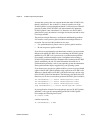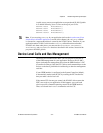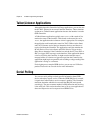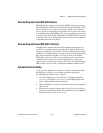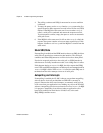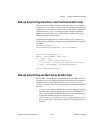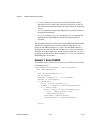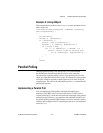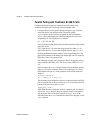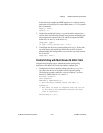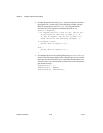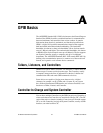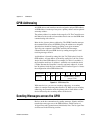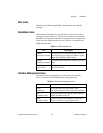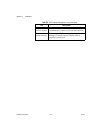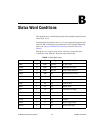Chapter 8 NI-488.2 Programming Techniques
NI-488.2 User Manual 8-18 ni.com
Parallel Polling with Traditional NI-488.2 Calls
Complete the following steps to implement parallel polling using
traditional NI-488.2 calls. Each step contains example code.
1. Configure the device for parallel polling using the
ibppc function,
unless the device can configure itself for parallel polling.
ibppc requires an 8-bit value to designate the data line number,
the
ist sense, and whether the function configures the device for
the parallel poll. The bit pattern is as follows:
0 1 1 E S D2 D1 D0
E is 1 to disable parallel polling and 0 to enable parallel polling for that
particular device.
S is 1 if the device is to assert the assigned data line when
ist is 1,
and 0 if the device is to assert the assigned data line when
ist is 0.
D2 through D0 determine the number of the assigned data line. The
physical line number is the binary line number plus one. For example,
DIO3 has a binary bit pattern of 010.
The following example code configures a device for parallel polling
using traditional NI-488.2 calls. The device asserts DIO7 if its
ist
is 0.
In this example, the
ibdev command opens a device that has a primary
address of 3, has no secondary address, has a timeout of 3 s, asserts
EOI with the last byte of a write operation, and has EOS characters
disabled.
#include "ni488.h"
dev = ibdev(0,3,0,T3s,1,0);
The following call configures the device to respond to the poll on DIO7
and to assert the line in the case when its
ist is 0. Pass the binary bit
pattern, 0110 0110 or hex 66, to
ibppc.
ibppc(dev, 0x66);
If the GPIB interface configures itself for a parallel poll, you should
still use the
ibppc function. Pass the interface index or an interface
unit descriptor value as the first argument in
ibppc. Also, if the
individual status bit (
ist) of the interface needs to be changed, use the
ibist function.



